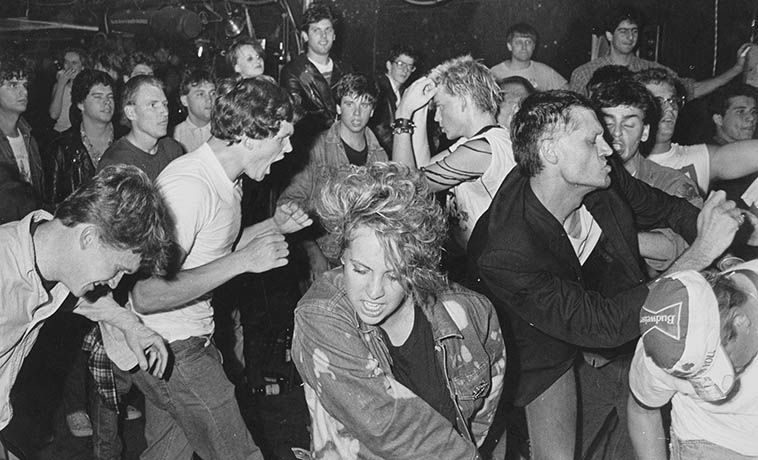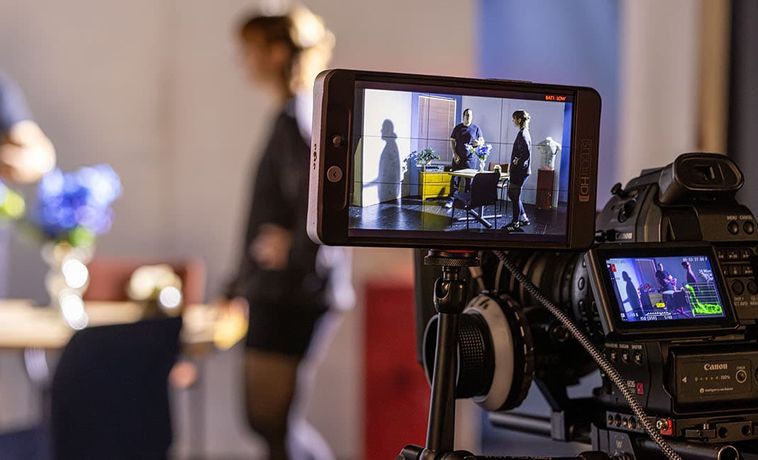Healthy COM-versation
The podcast that gets COM’s researchers and practitioners talking about what’s current in media and communications has big plans for Season 2

The COMversation, l to r: Michelle Amazeen, Tammy Vigil and Charlotte Howell
Charlotte Howell has always watched a lot of television, both because she loves it and because it’s her job. The associate professor and director of COM’s film and television studies program says the variety of screen time she enjoys has stoked her curiosity to learn more about how the world works—a curiosity she says made her the perfect person to host The COMversation, a podcast that explores communication research and current events with COM faculty and guests. Season two of the podcast is scheduled to release this fall.
“I talk to someone who’s studying something, and it connects to all these things I’ve seen or read,” Howell says. “I feel like my curiosity pings in all sorts of directions, so The COMversation has been very rewarding in a lot of ways.”
Since joining COM’s faculty in 2016, Howell’s research and teaching have centered around a variety of television-related topics such as representation, industry and audiences. She teaches courses on television genres, streaming and the way TV interfaces with comic books, religion and sports. Howell planted the seeds of the podcast in 2023 at a COM summer retreat, where faculty brainstormed ways to break down some of the siloes that had built up between COM researchers and practitioners, and between departments.
“I brought up the idea of a podcast that would cross those boundaries, try and get different perspectives from the departments, and put practitioners and scholars in conversation,” Howell says. “I always learn a lot from talking with my practitioner colleagues, because I never worked in the industry.”
Making a Podcast
By fall 2024, Howell had found a center that was interested in financially and institutionally sponsoring the podcast—COM’s Communication Research Center (CRC)—and was recording the first episodes of The COMversation, with production assistance from students Abby Bonner (’23,’25) and Eliza Lakritz (’25). “They were the ones that made the podcast happen,” Howell says. “I feel like it’s really valuable experience for them that hopefully translates to opening some doors when they’re looking for jobs or careers.”
With input from her student assistants, COM faculty and the CRC, Howell put together a seven-episode season that featured 30-minute discussions on topics ranging from the success of the Wicked movie (with Patrice Oppliger, assistant professor of media science, and Debbie Danielpour, assistant professor of film and television) to our relationship with artificial intelligence (with Margaret Wallace, associate professor of the practice, media innovation, and Kathryn Coduto, assistant professor of media science). Other episodes explored the cultural history of the Oscars, youth in media, sports media, and a conversation with Mara Einstein, a professor at The City University of New York who was in town for a CRC February Colloquium where she spoke about cult-like behavior in marketing and politics.
A week before taping an episode, Howell or one of her student assistants sends a list of potential questions to the guests for their feedback. In the interview, Howell will often first ask broader questions about a guest’s research before digging a little deeper in her follow-ups. In her episodes with multiple guests, Howell says she is looking to foster a dialogue that finds common ground between a researcher and a practitioner or between researchers from different departments in COM.
“I really encourage my colleagues to let their true selves shine through,” she says. “You get a sense of their personality, their tastes and their camaraderie within the conversation. I think that really sets us apart, bringing different perspectives to a general topic. It quickly brings you into a level of depth that is not intimidating.”
She mainly sees the podcast’s audience being internal—as a teaching tool for students in classrooms across COM and to promote the college’s communication research across the BU community—but thinks The COMversation, with its shorter episodes and avoidance of academic jargon, will appeal to a broader audience. “I do hope that people outside of BU find this and get a different perspective that is not the same conversation you’re hearing on Pop Culture Happy Hour or on Marketplace, which are wonderful podcasts that I listen to,” Howell says. “My hope is that it’s interesting, it’s informative and it showcases the depth that public scholarship can offer the cultural conversation.”
Building on What’s Worked
For Howell, the Wicked episode embodied the “unstuffy scholarship” she hopes comes through on The COMversation. The episode brought together Danielpour’s experience as a musical scriptwriter and Oppliger’s research of gender representations in media.
“I had heard, by that point, probably three hours of different people’s perspectives on Wicked, and yet in that episode I felt like I was learning something new about it as a musical, a movie, a context I thought I had known pretty well up to that point,” Howell says.
Season 2 of The COMversation is still being planned, but Howell says she would like to interview a faculty–student pair and is interested in bringing COM alumni into the mix. Howell will work with new student assistants and CRC staff in the fall to come up with a list of topics and guests, but she says listeners should look out for an episode about TikTok, should there be an update to rumors of its sale to an American buyer, and perhaps one on the shifting state of superhero films and series.
“As a big nerd, I would be very interested in having that conversation,” Howell says. “I just have to figure out who might want to talk about that with me.”



